Tiga gallery
- 1982 Tiga FA82 Formula Pacific / Formula Mondial in the pits at the 2009 Historic Sandown
- 1983 Tiga SC83 Sports 2000 car
- 1985 Tiga GT285 IMSA GTP car
Tiga Race Cars Ltd. was a British auto racing constructor and team. The company was founded in 1974 by two former Formula 1 drivers, Australian Tim Schenken and New Zealander Howden Ganley. The company's name was formed by the first two letters of Tim and Ganley. Tiga constructed racing cars for various forms of open wheel racing and sports car racing, ranging from Formula Ford to the World Sportscar Championship.
Over 400 chassis were sold by Tiga before the company folded in 1989. [1]
Drivers of Tiga-built cars won numerous championships and events, including three European, four British and one American Sports 2000 championships and two Australian Drivers' Championships, as well as class wins at the 24 Hours of Le Mans and the 24 Hours of Daytona. Spice Engineering used a Spice-Tiga GC85 Ford to win the Group C2 Teams title in the 1985 World Endurance Championship [2] and Tiga won the 1988 Camel Lights Championship for Manufacturers in the North American IMSA GT Championship.
The rights to use the name of Tiga Race Cars were purchased by racing driver and businessman Mike Newton in 2012.
The newly relaunched racing car manufacturer developed a Speed Euroseries CN car, the Tiga CN012 for the 2012 season.
In 2013, Tiga bought the IP rights and all existing tooling and data of the Embassy Racing WF01 LMP2 sportscar, with the intention of modifying the car to comply with the revised cost-cap regulations of the then-current LMP2 class. The car's engine was changed over from its original Zytek V8 to the Judd Power HK. Tiga planned to offer the car for sale to potential customers in time for the 2014 season but the car never raced.

Sports car racing is a form of motorsport road racing which utilises sports cars that have two seats and enclosed wheels. They may be purpose-built prototypes or grand tourers based on road-going models. Sports car racing is one of the main types of circuit auto racing, alongside open-wheel racing, touring car racing and stock car racing. Sports car races are often, though not always, endurance races that are run over particularly long distances or large amounts of time, resulting in a larger emphasis on the reliability and efficiency of the car and its drivers as opposed to outright car performance or driver skills. The FIA World Endurance Championship is an example of one of the best known sports car racing series.

A Le Mans Prototype (LMP) is a type of sports prototype race car used in various races and championships, including the 24 Hours of Le Mans, FIA World Endurance Championship, IMSA SportsCar Championship, European Le Mans Series, and Asian Le Mans Series. Le Mans Prototypes were created by the Automobile Club de l'Ouest (ACO). The technical requirements for an LMP include bodywork covering all mechanical elements of the car. As of 2023, there are two classes within Le Mans Prototypes, designated LMP2 and LMP3.

Group C was a category of sports car racing introduced by the FIA in 1982 and continuing until 1993, with Group A for touring cars and Group B for GTs.

The World Sportscar Championship was the world series run for sports car racing by the FIA from 1953 to 1992. The championship evolved from a small collection of the most important sportscar, endurance, and road racing events in Europe and North America with dozens of gentleman drivers at the grid to a professional racing series where the world's largest automakers spent millions of dollars per year.

Radical Motorsport is a British manufacturer and constructor of racing cars. The company was founded in January 1997 by amateur drivers and engineers Mick Hyde and Phil Abbott, who built open cockpit sportscars which could be registered for road use and run on a track without modification. Radical produce a mix of purpose built race cars as well as road legal sports cars in varying specifications. Their most popular car is the Radical SR3.
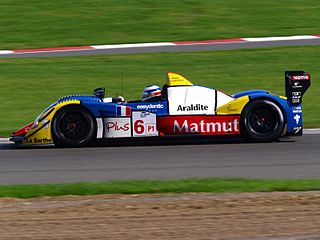
Courage Compétition was a racing team and chassis constructor company now owned by Oreca, based in Le Mans, France, near the Circuit de la Sarthe. It was founded by Yves Courage, a French race driver who ran hillclimbs before founding the company. Following the purchase of Courage by Oreca in 2007, Yves Courage has refounded the company as Courage Technology in 2010, attempting to develop electric racing cars.
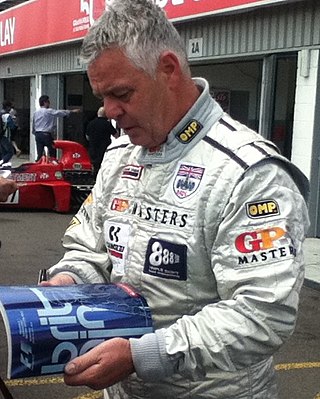
The 1992 Sportscar World Championship season was the 40th and final season of FIA World Sportscar Championship motor racing. It featured the 1992 FIA Sportscar World Championship, which was contested over a six race series which ran from 26 April to 18 October 1992. The championship was open to Group C Sportscars.
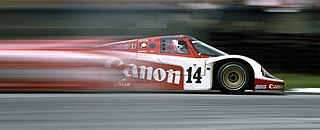
The 1985 World Sportscar Championship season was the 33rd season of FIA World Sportscar Championship motor racing. It featured the 1985 World Endurance Championship which was contested over a series of races for Group C1 and Group C2 Prototypes, Group B GT Cars and IMSA GTP cars. The series ran from 14 April 1985 to 1 December 1985 and was composed of 10 races.
Dyson Racing is a professional sports car racing team based in Poughkeepsie, New York in the United States. Founded by Rob Dyson in 1974, the team competed successfully in North American sports car racing series, including the IMSA GT Championship and American Le Mans Series.

Spice Engineering was a British racing team founded by driver Gordon Spice with Raymond Bellm in the early 1980s, later becoming a successful sports car constructor in 1986. They competed in the World Sportscar Championship in Europe as well as the IMSA GT Championship in North America, at times partnering with major manufacturers such as General Motors and Honda as well as race engine manufacturer Comptech.
Advanced Engine Research, Ltd. is an auto racing engine manufacturer based in Basildon, Essex, England. Established in 1997, AER has developed winning engines for a number of high-profile international race series in sports car, prototype racing, rallying, touring car, and open wheel racing. They have designed engines derived from road car platforms, but their emphasis is on clean sheet designed engines with a focus on electronics and turbochargers. Their engines have raced in the 24 Hours of Le Mans, the World Endurance Championship (WEC), the European Le Mans Series (ELMS), the IMSA SportsCar Championship, GP3, British Touring Car Championship (BTCC), Nissan/Renault World Series, Grand-Am, Paris Dakar and FIA Sportscar Championship. They have worked with a number of manufacturers including Mazda, Ford, Hyundai, MG/Rover, Nissan, and Toyota. In 2012, AER developed and built Formula One turbo test engines to current rules and in July 2012, AER was chosen as engine partner and supplier to the new GP3 racing series. They currently supply engines for the Indy Lights series.
The BRDC C2 Championship was a short lived sports car racing series which ran from 1988 to 1990. The series was for Group C cars which fit into the smaller, less powerful, and cheaper C2 category. All races were run in the United Kingdom. The British Racing Drivers' Club ran the series during its lifetime.

The 1984 Sandown 1000 was an endurance motor race staged at the Sandown Raceway in Victoria, Australia on 2 December 1984. It was the eleventh and final round of the 1984 FIA World Endurance Championship and was the first FIA World Championship race to be held in Australia. It was to be the first of a three-year contract to race at Sandown, though the final two years would be cancelled.
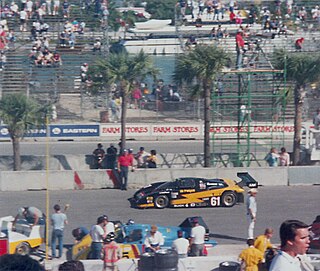
Argo Racing Cars Ltd. is a British racing constructor founded by Swiss designer Jo Marquart and British mechanic Nick Jordan as part of their Anglia Cars racing team in the 1980s. The company initially constructed a variety of open-wheel cars for national and international Formula Three, as well as the Formula Atlantic and Formula Super Vee series. The company later built sports prototypes for the World Sportscar Championship's C2 class and the North American IMSA GT Championship's IMSA Lights category, winning several championships.
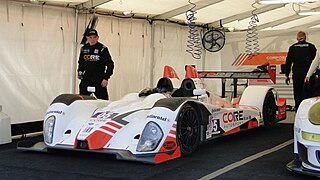
The Le Mans Prototype Challenge was a spec sports prototype formula created by the Automobile Club de l'Ouest (ACO), organisers of the 24 Hours of Le Mans, and sports car constructor Oreca. The formula is intended as part of a ladder system for young and upcoming drivers into the world of endurance racing while also serving as a value engineered entry for drivers and teams into Le Mans Prototypes due to limitations on manufacturers and suppliers.

Formula Enterprises or Formula SCCA is a class of open wheel race car sanctioned by the Sports Car Club of America. A spec racing class, all chassis are produced by SCCA Enterprises in association with Van Diemen and include a sealed Mazda MZR powerplant. The chassis can also be fitted with closed-wheel bodywork and converted into a sportscar to race in C Sports Racer or the L3 class of IMSA Prototype Lites. For the 2012 season, the car was also accepted into the U.S. F2000 National Championship's National Class. According to the manufacturer's website, as of March 2010, 120 of the cars have been sold.
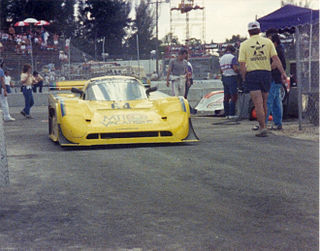
The Spice SE89C is a Group C1 and Group C2 sports prototype race car, designed, developed, and built by British manufacturer, Spice Engineering, for sports car racing in the World Sportscar Championship and IMSA GTP Championship, in 1989.

Robin Donovan is a British former racing driver. He is best known for competing in 14 editions of the Le Mans 24 hours race; his best result there being 6th overall, 3rd in class (LMP1) and 1st privateer home driving with 5 x Le Mans winner Derek Bell MBE and Daytona 24 hours winner Jurgen Lassig in 1994 with the Gulf Racing entered and sponsored Kremer Porsche K8.
Louis "Wiet" Huidekoper was Dutch racecar designer and former technical director for the Opel DTM programme. His major career was in the international sports car racing arena.
Chamberlain Engineering was an automotive engine builder turned auto racing team founded by racing driver Hugh Chamberlain in 1972. The team moved through the British national sports car championships before becoming a competitor in the World Sportscar Championship, eventually winning world titles in 1989 and 1992. Chamberlain went on to develop sports cars for Jaguar and Lotus in the 1990s before becoming a customer of the Chrysler Viper GTS-R program in the FIA GT Championship; the team later led MG's return to Le Mans in 2001. Chamberlain later merged with Gareth Evans to form Chamberlain-Synergy Motorsport to campaign TVRs in 2004 before moving to the European Le Mans Series where they won another championship in 2005. Chamberlain-Synergy left active motorsports in 2008, although Hugh Chamberlain continues to work as a manager and consultant with other teams in sports car racing.